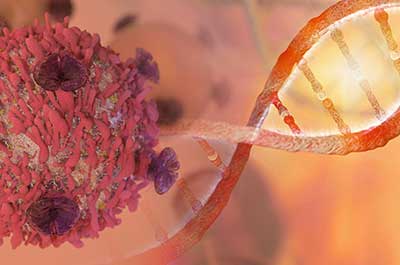Vaccines are one of the greatest advances of modern medicine—and they have greatly helped to increase the average life expectancy. While vaccines have traditionally been used to prevent viral and bacterial infections, they’re breaking ground as a potential cancer treatment. But the concept of cancer vaccines is not new.
“Cancer vaccines have been studied for decades, but they’ve been largely unsuccessful until recently,” says Amy Weise, D.O., a medical oncologist at Henry Ford Health. “While we still have a long way to go, we’re getting better at identifying tumor markers to target specific tumors, as every tumor has its own fingerprint. We’re also getting better at understanding the immune system.”
The immune system, she explains, is designed to attack foreign invaders, but cancer is not a foreign invader. Cancer develops from our own cells, so the immune system recognizes it as such. Cancer also creates a microenvironment that suppresses the immune system—two factors that make it difficult for the immune system to control cancer.
“Now, however, we know more about how to use vaccines to heighten the body’s immune response to attack a tumor,” says Dr. Weise. “And we’re getting better at using vaccines to shut down molecules within the tumor that suppress the body’s immune response. With this knowledge, the probability of making successful cancer vaccines significantly increases.”
There are a few different types of cancer vaccines that are being studied: vaccines for cancer prevention, therapeutic vaccines to treat cancer (which is what Dr. Weise describes above) and vaccines to prevent cancer recurrence. Here, she explains each.
Vaccines For Cancer Prevention
You may have already heard of the two FDA-approved cancer-prevention vaccines: the HPV vaccine to prevent cervical, vaginal, penile, anal, vulvar and throat cancer, and the hepatitis B vaccine to prevent liver cancer.
These vaccines work by preventing infection from the HPV and hepatitis B viruses, which cause cancer. “If you can prevent someone from getting infected with the virus, you can prevent them from developing the cancer that’s associated with it,” says Dr. Weise.
So are more cancer prevention vaccines on the way? That would be the end goal, but it’s much harder to develop a prevention vaccine for breast cancer, for example, which doesn’t have one clear-cut cause, than it is for a cancer that’s predominately caused by a virus, she explains.
Therapeutic Vaccines To Treat Cancer
Therapeutic vaccines are for those who have active cancer. Provenge (sipuleucel-T), is an FDA-approved vaccine for those with stage 4 prostate cancer.

Cancer Care At Henry Ford
“Basically, this vaccine involves taking someone’s immune cells and a piece of their tumor, exposing the immune cells to the prostate cancer cells and injecting the immune cells back into the person,” says Dr. Weise. “Doing this activates the immune cells to recognize a portion of the cancer cells so the immune system can destroy them.”
This is what’s called a personalized vaccine, which might prove to be very effective in the future. “One person’s tumor isn’t identical to another person’s tumor,” says Dr. Weise. “If we can personalize a vaccine to target the makeup of someone’s specific tumor, the better opportunity we have to destroy it.”
The downside is that personalized vaccines currently take weeks to create, since it requires shipping part of someone’s tumor and immune cells to a lab. The lab creates a replica of the tumor and exposes it to the immune cells, which are then sent back and infused into the patient.
“It’s quite a process—you must ensure the cells don’t get contaminated and that they’re stored and handled properly so they don’t die,” says Dr. Weise. “That said, I think it’s very possible that in the future we’ll be able to create personalized vaccines on a larger scale.”
Another therapeutic vaccine, called T-VEC, is FDA-approved for those diagnosed with metastatic melanoma. It is not a personalized vaccine but a modified virus that’s injected directly into the tumor. “It draws the immune cells to the area to kill the cancer cells. The injected virus itself can also kill the cancer cells,” says Dr. Weise.
Vaccines To Prevent Cancer Recurrence
An FDA-approved vaccine, called BCG, has been shown to treat early-stage bladder cancer and even help prevent its recurrence.
“This vaccine uses an inactivated tuberculosis bacteria (which doesn’t cause serious disease) and injects it into the bladder,” says Dr. Weise. “This activates the immune system to hopefully destroy any cancer cells.”
A recent small study also showed promise with pancreatic cancer recurrence: a personalized vaccine incited a strong immune response in half of patients with pancreatic cancer. Pancreatic cancer is one of the deadliest cancers and the five-year survival rate is just 12%. But Dr. Weise says it is too early to tell whether the vaccine will prove to be effective.
“We always view early phase clinical trials with caution, because unfortunately a lot of phase 1 and phase 2 clinical trial data don’t end up corresponding with phase 3 data,” says Dr. Weise. “But there are so many trials out there right now when it comes to cancer vaccines. If you are interested, the best place to find one for you is a website called clinicaltrials.gov, which lists all of the available clinical trials around the country.”
Reviewed by Amy M. Weise, D.O., a medical oncologist who sees patients at Henry Ford – Cancer in Detroit and Henry Ford Medical Center – Columbus.



